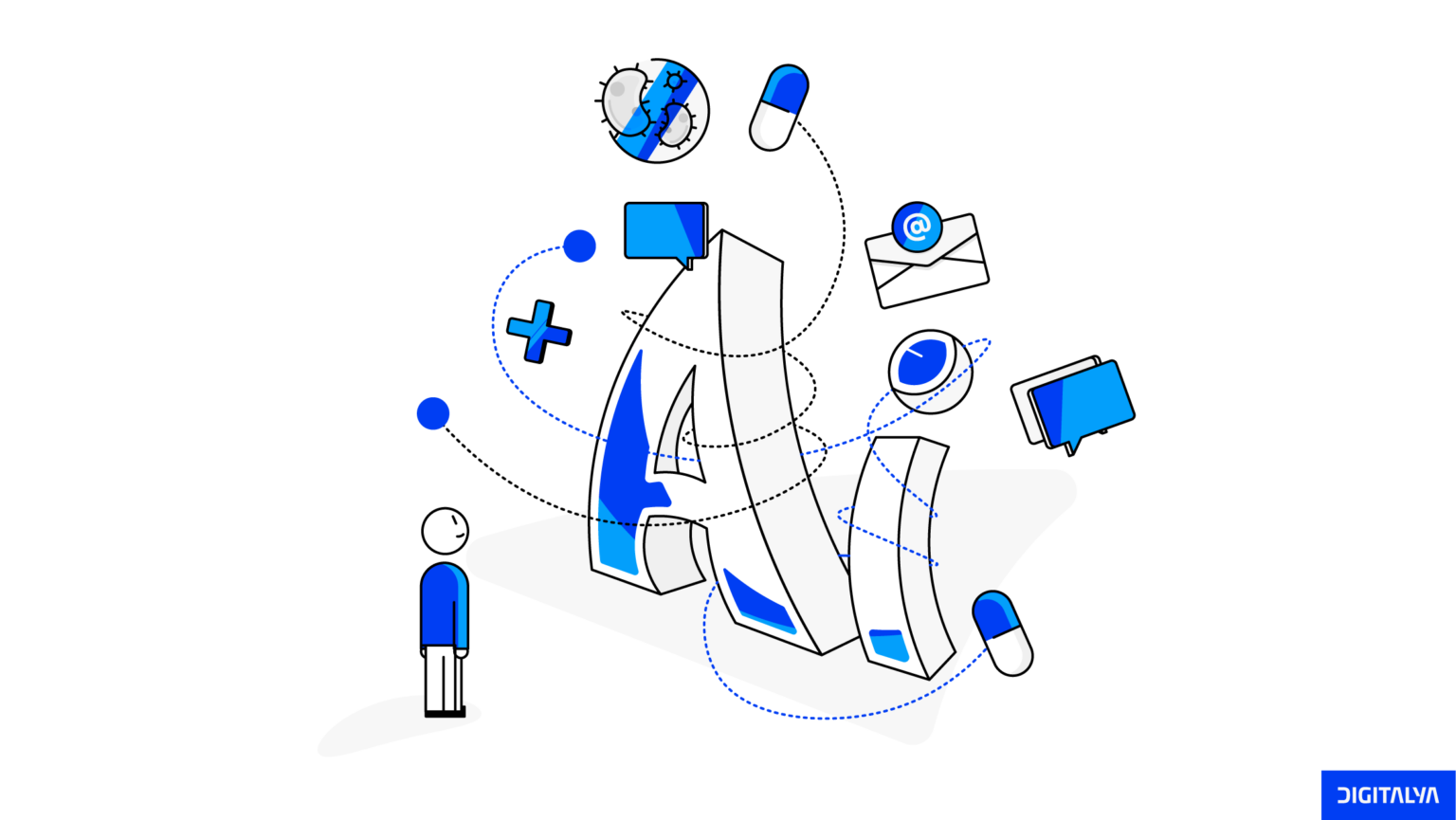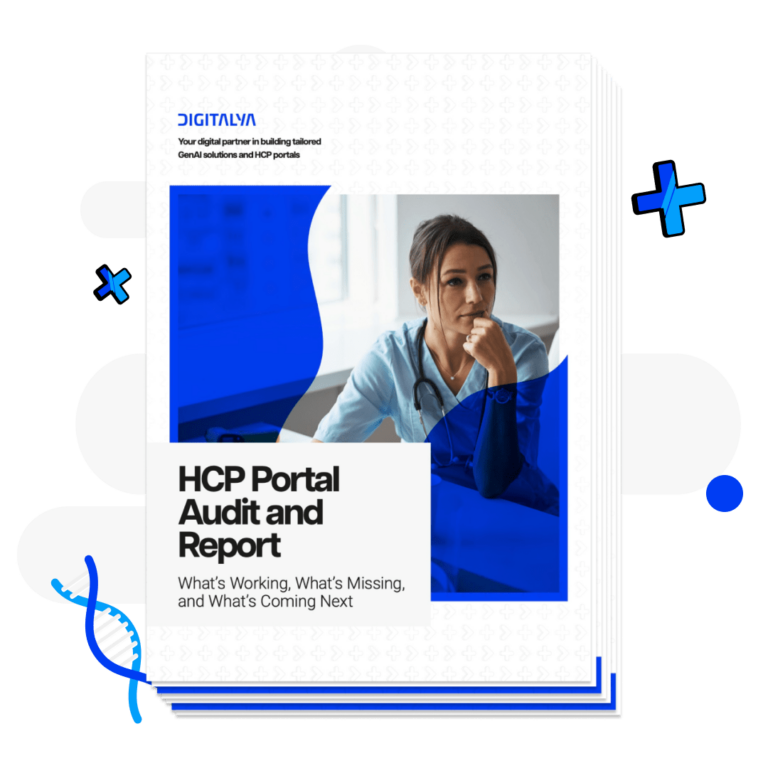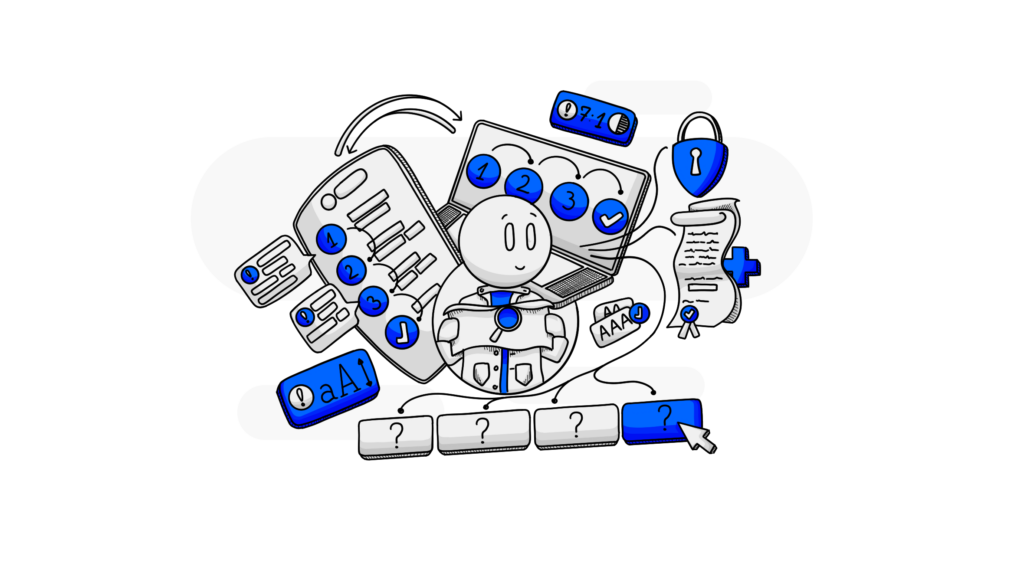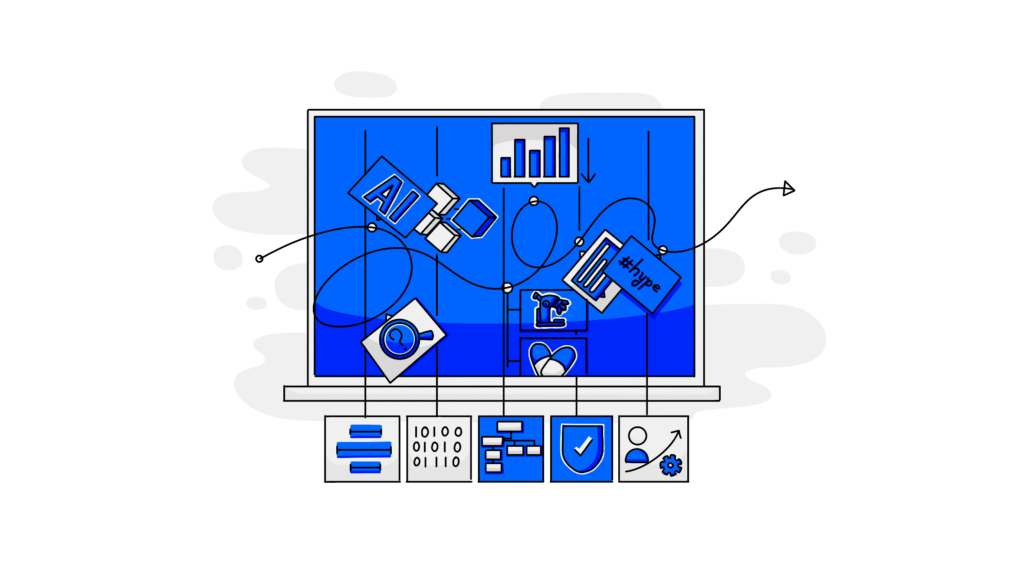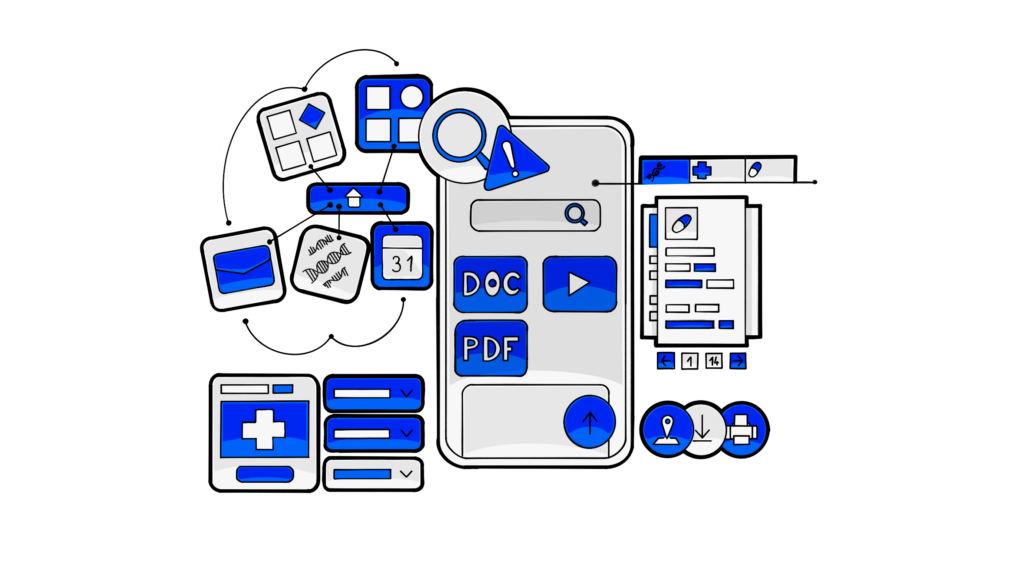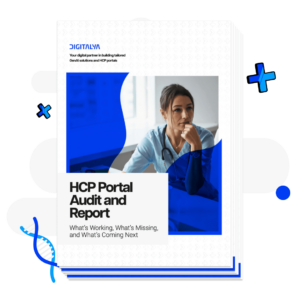1. The evolving landscape of HCP engagement
The pharmaceutical industry is in a state of constant evolution, driven by advancements in technology, shifting HCP and patient needs, and an increased focus on personalized care. Within this dynamic environment, digital HCP engagement has become crucial, utilizing various online channels and platforms to connect with healthcare professionals.
Gone are the days of one-size-fits-all approaches; today’s life sciences companies embrace innovative strategies to foster meaningful and impactful relationships with HCPs.
1.1 Challenges of traditional engagement methods
The traditional methods that dominated outreach for decades are struggling to keep pace with the realities of today’s HCP environment. Let’s take a closer look at the key factors and drivers of this evolution:
- Limited reach and relevance — in-person meetings, once a cornerstone of the pharma strategies, often fail to reach the right people at the right time. Busy schedules and information overload make it difficult for HCPs to dedicate significant time to pharma reps, lending to generic presentations with limited relevance to their specific need.
- Information overload — HCPs are bombarded with research updates, marketing efforts, and product pitches from various sources. Traditional methods can contribute to this noise, leading to decreased engagement and a struggle to stand out.
- Time constraints — with ever-increasing patient loads and administrative burdens, HCPs have less time for lengthy sales calls or product presentations. Traditional methods can be seen as disruptive and time-consuming.
- The impact of the pandemic — the COVID-19 pandemic drastically reduced in-person interactions between sales reps and HCPs. This forced a rapid shift towards digital engagement strategies. While face-to-face interactions have returned to some degree, the adoption of digital channels has been accelerated.
1.2 The rise of digital channels and the omnichannel imperative in digital engagement
Digital channels and mobile apps have fundamentally changed how HCPs access information, connect with colleagues and interact with pharmaceutical companies. This is driven by a few key factors:
- Convenience and accessibility — a digital solution offers physicians constant access to information and resources. They can access product information, clinical trial data, and educational resources on their own time.
- Targeted communication — through digital channels, pharma marketers can leverage data and analytics to deliver personalized content that aligns with each HCP preferences and behaviors. This fosters deeper engagement and ensures physicians receive the most relevant information.
- Interactive learning — digital channels offer a range of interactive content formats, like webinars, online simulations, podcasts, interactive tools, and educational games. These formats can be more engaging and effective than traditional lectures or presentations.
- Virtual events — the increasing preference among medical practitioners for virtual events, particularly webinars, provides flexibility and accommodates busy schedules. These events offer personalized experiences and boost engagement opportunities for pharmaceutical companies.
- Community building — digital platforms facilitate the creation of online communities where HCPs can connect with colleagues, share knowledge, and participate in discussions that lead to better patient outcomes. This fosters collaboration and keeps them updated on treatment guidelines and advancements in the field.
- Data-driven insights — digital interactions with physicians provide valuable insights about their preferences and information on consumption habits. Pharma can leverage this data to refine their marketing strategy and personalize their marketing efforts.
The rise of digital channels doesn’t negate the value of traditional healthcare marketing methods. The key to success lies in an omnichannel approach. This means seamlessly integrating both online and offline channels to create a unified and consistent HCP experience. This involves:
- Understanding the customer journey — mapping out the various touchpoints HCPs have with a brand across different channels (website, email, conferences, etc.)
- Content consistency — ensuring that messaging, marketing content, and brand identity remain consistent across all channels. For example, a product brochure should reflect the same language and tone as the company website.
- Seamless transitions — providing smooth and effortless engagement experiences for HCPs as they move between channels. For instance, an email promoting a webinar could include a link for easy registration.
- Personalized journey — the omnichannel experience should be personalized to the individual preferences. This might involve allowing them to switch between online research and meeting with sales representatives with ease or providing them with the option to receive follow-up information via their preferred channel.
- Data-driven optimization — information gathered across all channels can be used to optimize the HCP engagement strategy and improve the measurable impact of the marketing efforts. By analyzing user behavior, pharma marketers and commercial leaders can gain insights about which channels are most effective for reaching specific HCP segments and tailor their content delivery to maximize meaningful interactions with the product or brand.
- Optimizing reach and impact — using a combination of digital and traditional methods, brand teams can maximize reach and ensure their message resonates with a wider audience.
Omnichannel engagement isn’t just about deploying multiple channels; it’s about creating a unified ecosystem where each channel complements and reinforces the others. This allows pharmaceutical companies to build stronger connections with HCPs, ultimately leading to better patient care and improved health outcomes.
2. Why personalized engagement matters
Imagine a busy doctor at a conference about medical products. A generic booth with loud music and free pens might not grab their attention. However, a personalized approach, where a representative has a deep understanding of the doctor’s specialty and offers relevant and targeted information about relevant products, is far more likely to spark a meaningful conversation.
Simply bombarding a healthcare professional with generic marketing messages is no longer effective. This is where personalized digital HCP engagement becomes crucial.
- Cutting through the noise
HCPs are bombarded with research updates, product information, and marketing materials from various sources, leading up to high cognitive load. Personalized engagement efforts ensure they receive relevant information tailored to their specific needs and interests, cutting through the noise and increasing the likelihood of them paying attention.
- Building trust and relationships
When physicians receive targeted communication that addresses their specific challenges and patient populations, it fosters a sense of trust, builds stronger relationships, and positions the company as a credible source of information.
- Improving efficiency and decision-making
Physicians don’t have time to wade through irrelevant information. Personalized digital engagement ensures they receive the most pertinent details about the products and therapies that align with their practice area, allowing them to make more efficient, informed decisions.
- Increased engagement and ROI
Tailored communication is more likely to resonate with physicians, leading to increased engagement with educational content and product information and, ultimately, a higher ROI for pharmaceutical companies.
- Stronger brand loyalty
HCPs who feel valued and supported are more likely to develop brand loyalty. Personalized engagement fosters a sense of partnership and collaboration, leading to long-term, mutually beneficial relationships.
In essence, personalized HCP engagement is all about building meaningful connections. By better understanding individual needs and using data driven strategies to tailor communication accordingly, pharma companies can create a win-win situation for themselves, HCPs, and patients.
3. The power of AI in HCP engagement
AI has revolutionized various industries, and the life sciences industry is no exception. AI systems in pharma marketing and HCP engagement are powerful tools, offering transformative capabilities that redefine how pharma interacts and engage with physicians.
3.1 Beyond automation — AI as a strategic tool for pharma
Artificial intelligence is emerging as a tool for automation but a strategic asset that can drive innovation, efficiency, and growth. Beyond streamlining processes and reducing operational costs, AI offers pharma companies unprecedented capabilities to transform their business models, enhance data driven decision making, and create value across the healthcare ecosystem.
Pharma plays a crucial role in building relationships and providing value through AI-driven insights, enhancing collaboration and trust with healthcare providers.
AI can accelerate the drug discovery and development process by facilitating the analysis of complex biological data, identifying potential drug candidates, and optimizing clinical trial design.
Machine learning algorithms can predict drug interactions, assess safety profiles, and stimulate drug responses, enabling faster, more efficient, and cost-effective development of innovative therapies and treatments.
Additionally, AI can play a pivotal role in personalized medicine by analyzing individual patient data, genetic profiles, and disease characteristics to customize treatment plans and interventions.
By leveraging AI-driven insights, pharmaceutical companies can develop targeted therapies, optimize medication dosages, and improve patient outcomes, fostering a more personalized and effective approach to healthcare delivery.
3.2 Targeting, personalization, and predictive analytics
These AI capabilities work together to create a powerful and dynamic HCP engagement strategy. AI-powered targeting ensures the right message reaches the right audience. Personalization tailors the message to resonate with their specific needs. Predictive analytics allows pharma companies to anticipate what information HCPs will need and deliver it proactively. Real-time intelligence allows modern systems to process data swiftly and accurately, enhancing targeting and engagement strategies.
- Precise targeting
By analyzing vast datasets (demographics, practice areas, research interests, prescribing habits), AI can identify high-value HCPs most receptive to specific therapy products. This will eliminate scattershot outreach and ensure messages resonate with the right target audience.
However, AI goes beyond basic demographics. It can segment HCPs based on factors like past interactions, research interests, and treatment modalities used. This allows for highly targeted campaigns customized to HCP behaviors and preferences.
Additionally, AI isn’t static. It can adapt outreach based on real-time data. For example, AI can identify physicians actively researching a specific disease area and deliver relevant information about a new treatment option.
AI-powered targeting allows pharma companies to allocate resources more efficiently by focusing on HCPs most likely receptive to their products, services, or educational initiatives. This strategic allocation enhances ROI, maximizes engagement opportunities, and drives better outcomes for pharma companies and HCPs.
- Personalized communication
AI analyzes data to provide insights into HCP preferences and what knowledge gaps they have. This allows the creation of customized content, such as research summaries, treatment recommendations, and educational materials, that address their specific needs and interests.
On top of that, it can support consistent messaging across various communication channels (email, web portals, mobile apps, social media). This creates a seamless experience for physicians and reinforces key messages.
AI can personalize content delivery based on HCP behavior. For instance, if a healthcare professional frequently reads case studies, it can prioritize this format when delivering new medical information.
This allows pharma companies to develop customized engagement strategies for different HCP segments, ensuring that each interaction is meaningful, valuable, and aligned with HCPs’ unique requirements. This tailored and targeted approach enhances the overall HCP experience and strengthens relationships over time.
- Predictive analytics
Artificial intelligence can analyze past interactions, industry trends, and research activity to predict HCP information needs before they arise. This allows pharma companies to deliver proactive and relevant content, positioning them as a trusted resource for HCPs.
It can also analyze HCP engagement metrics (open rates, click-throughs, time spent on content) to identify what resonates and doesn’t. This allows for continuous optimization of campaigns, maximizing their effectiveness.
On top of that, AI can use historical data to predict an HCPs preferred communication channel and content formats. This makes tailored outreach more likely to get notified and acted upon, possible.
Providing actionable insights and recommendations empowers pharma companies to optimize decision-making processes, mitigate risks, and capitalize on new opportunities, driving sustainable growth and success.
AI can also allow the identification of key opinion leaders based on the interactions with the brand and communications they have online.
3.3 Streamlining workflows and automating repetitive tasks
The pharmaceutical and healthcare industry constantly battles the clock. Busy schedules leave little room for lengthy sales calls or sifting through mountains of data. AI can free up valuable time for both pharma reps and HCPs.
Medical specialists play a crucial role in managing health conditions and engaging with pharmaceutical representatives, providing valuable insights that enhance the overall healthcare ecosystem.
- Automating repetitive tasks
AI-powered assistants can handle time-consuming administrative tasks like scheduling appointments, following up on emails, and generating reports. This allows pharma reps to focus on building meaningful connections with HCPs and delivering high-value interactions.
Additionally, AI can automate data entry from various sources, including HCP interactions, clinical trials, and market research. This ensures accuracy, saves time, and allows pharma teams to focus on analyzing insight. AI can also extract insights from massive datasets created by the adoption of digital tools, enhancing marketing efforts through targeted engagement and meaningful interpretation of data.
On top of that, it can streamline content creation and distribution. From identifying relevant research articles to automatically tailoring content for specific physicians, AI reduces the manual workload and ensures the timely delivery of valuable medical information everywhere.
- Streamlining workflows
AI-powered scheduling tools can automate appointment scheduling and send personalized reminders to HCPs and sales teams. This minimizes scheduling conflicts and ensures timely follow-up.
It can analyze vast data sets and provide HCPs with instant access to the information they need at a point in time. This eliminates the need for time-consuming searches and allows HCPs to make informed decisions quickly.
AI can also analyze interactions and identify high-priority leads or areas requiring further attention. This allows sales teams to focus their efforts on the most promising opportunities and maximize engagement impact.
3.4 Personalized communication and 24/7 support
While AI plays a crucial role in tailored communication and offering constant support, the human element remains vital. The complexity of providing healthcare and nuanced discussions require the empathy and expertise of humans. AI empowers sales teams with insights and tools to have more meaningful interactions with HCPs, building stronger connections.
- Personalized support for individual needs
AI analyzes healthcare provider data (part interactions, research interests, areas of practice) to understand their preferred communication methods, content formats, and areas of expertise.
Even more, it can personalize content delivery, ensuring HCPs receive relevant information that aligns with their specific needs and interests. This could include research summaries, treatment recommendations, case studies, or educational materials.
It can also analyze trends and predict HCP information needs before they arise. This allows pharmaceutical companies to deliver proactive support and position themselves as trusted sources.
- 24/7 availability
Intelligent tools like AI chatbots or virtual assistants can give physicians 24/7 access to basic information, answer routine questions, and schedule appointments. This frees up sales teams to focus on high-value interactions.
AI can curate and manage on-demand content libraries that are accessible to HCPs at any time. This will empower them to learn and stay up-to-date on the latest advancements at their own pace.
Additionally, AI facilitates seamless communication across various channels. This ensures that HCPs receive consistent messaging and can connect with pharma companies through their preferred channels.
3.5 Ethical considerations in an AI-powered future for the pharmaceutical industry
The potential of AI (no matter if it’s natural language processors, generative AI, or other form) to revolutionize HCP engagement in pharma is undeniable. However, this power comes with a responsibility to ensure ethical and responsible implementation that follows regulatory compliance.
- Transparency and explainability
Many AI algorithms are complex and opaque, making it difficult to understand how they arrive at their conclusions. This lack of transparency can raise concerns about bias and fairness in HCP targeting and content delivery. Pharma companies should look for explainable AI that allows them to understand and communicate the rationale behind AI-driven recommendations.
Additionally, HCPs have the right to know when they are interacting with AI-driven tools in existing systems. Transparency builds trust and allows HCPs to make informed decisions about how they engage with pharma companies.
- Mitigating bias and ensuring fairness
AI algorithms are as good as the data they are trained on. Biased data can lead to biased AI outputs, potentially disadvantaging certain HCP specialties or practice areas. Pharma companies must actively identify and mitigate bias in their training data to ensure fair and equitable engagement with all HCPs.
On top of that, the algorithms themselves can introduce bias or raise regulatory compliance issues. Pharma companies should enjoy rigorous testing and validation procedures to identify and eliminate algorithmic bias and hallucinations before deploying the AI for HCP engagement in HCP portals or other digital environment.
4. AI use cases for personalized HCP engagement
AI holds immense potential to transform pharma HCP engagement from one-size-fits-all to a highly personalized experience. By leveraging these custom AI applications, pharma can build stronger relationships with medical practitioners, foster a culture of continuous learning, and ultimately contribute to improved healthcare delivery.
4.1 AI generated content recommendation systems
The traditional approach of blasting generic marketing materials to HCPs is becoming increasingly ineffective. AI-powered content creation and recommendation systems offer a revolutionary solution, delivering personalized and relevant content that resonates with individual HCP needs and preferences.
First of all, AI can help you with HCP profiling. This allows for creating content that directly addresses their specific knowledge gaps and areas of focus. You can automatically generate:
- Targeted research summaries — relevant to the physician’s field of practice.
- Treatment recommendations — tailored to specific patient populations they encounter.
- Educational materials — that address their areas of interest and bridge identified knowledge gaps.
However, it can go beyond basic targeting. AI doesn’t just create personalized content; it customizes delivery as well. AI can prioritize content delivery in a way that resonates most effectively by analyzing HCP behavior (e.g., preferred content format, time spent on different materials). For example, if an HCP frequently reads case studies, it can ensure case studies are included in future content recommendations.
What are some key applications of AI generated content recommendation systems?
| Scientific content creation | Personalized educational materials | Curating on-demand content libraries |
| AI can generate summaries of research papers, clinical trial data, and product information, all customized to the specific needs and interests of individual HCPs. | AI can repack educational materials into other content formats like infographics, slide decks, or interactive modules that address the specific knowledge gaps identified for each HCP. | AI can curate and manage on-demand content libraries accessible to HCPs 24/7. These libraries can house a variety of personalized content formats, allowing HCPs to learn and stay up-to-date at their own pace and based on their specific needs. |
What are the benefits of personalized content?
- Increased relevance and engagement — physicians are more likely to read and retain information that is directly relevant to their practice and interests. This leads to a more engaged audience and a more effective communication channel.
- Improved patient care — by making sure that HCPs have access to the latest information and targeted resources, AI content recommendations contribute to better-informed treatment decisions and, ultimately, improved patient outcomes.
- Building trust and credibility — delivering personalized and valuable content positions pharma as trusted resource partners for HCPs, fostering stronger and more collaborative relationships.
4.2 Intelligent chatbots and virtual assistants
The fast-paced world of healthcare demands constant access to information and support. HCPs juggle busy schedules, leaving little time for lengthy calls or navigating complex information portals. AI chatbots and AI virtual assistants are revolutionizing HCP engagement by providing 24/7 availability, streamlining interactions, and offering valuable support.
Unlike human representatives, chatbots and virtual assistants never sleep. HCPs can access information, schedule MSL visits, or get basic questions answered anytime. This eliminates the frustration of waiting on hold or missed connections, improving overall efficiency.
Additionally, chatbots can handle routine inquiries such as product information requests, appointment scheduling, or basic troubleshooting. This frees up valuable time for pharma reps to focus on more complex discussions and building relationships with clinicians.
While automation is a core benefit, intelligent chatbots go beyond simple pre-programmed responses.
| Natural Language Processing (NLP) | Machine learning | Integration with knowledge bases |
|---|---|---|
| AI with NLP allows chatbots to understand the nuances of human language, including intent, context, and even sentiment. This enables them to provide more natural and relevant responses to HCP inquiries. | Machine learning algorithms allow chatbots to learn and improve continuously over time. By analyzing past interactions, chatbots can refine their responses to better anticipate HCP needs and deliver more accurate information. | Chatbots can connect to vast knowledge bases containing drug information, clinical trial data, and product resources. This allows them to provide HCPs with comprehensive and up-to-date information at their fingertips. |
Next, by using sentiment analysis, pharma teams can interpret feedback from HCPs gathered through these chatbots and assistants, swiftly gauge satisfaction levels, and proactively address concerns based on the emotional tone of unstructured data collected.
What are the benefits of AI chatbots and virtual assistants?
- Improved HCP satisfaction — 24/7 availability, efficient task completion, and access to valuable information lead to a more positive and productive experience for HCPs.
- Increased pharma team productivity — by automating routine tasks, chatbots free up pharma reps to focus on high-value activities like strategic discussions and building relationships with doctors.
- Enhanced patient care — by empowering HCPs with on-demand information and support, chatbots indirectly contribute to better-informed treatment decisions.
4.3 Advanced HCP targeting and segmentation for healthcare professionals
Reaching the most relevant physicians is critical for pharma teams. Traditional methods often rely on broad demographics, missing valuable opportunities for targeted engagement. This is where AI steps in, offering advanced HCP targeting and segmentation capabilities to ensure messages resonate with the right doctors.
AI empowers pharma companies to move beyond basic demographics like age and location. It allows for segmentation on a rich tapestry of data points, including:
- Practice area and specialties — identifying HCPs specializing in specific disease areas allows for targeted communication about relevant products and therapies.
- Research interests and publications — AI can analyze HCPs’ research publications and affiliations to identify their areas of focus and tailor outreach accordingly.
- Prescribing habits and patient populations — understanding the patient demographics and conditions HCPs typically treat allows for targeted messaging about medications aligned with their practice patterns.
- Engagement history and past interactions — AI can analyze previous interactions with HCPs to understand their interests and preferred communication channels.
By leveraging this multi-dimensional data, AI facilitates advanced segmentation strategies.
| High-value HCP identification | Dynamic segmentation | Micro-segmentation |
| AI can pinpoint HCPs most likely receptive to specific products or therapies. This eliminates scattershot outreach and focuses resources on the most promising leads. | AI can adapt segmentation criteria based on real-time data. For example, AI can identify HCPs actively researching a new disease area and deliver relevant information about a recently launched treatment option. | AI allows for highly granular segmentation, creating tailored messaging for sub-specialties within a specific practice area. |
Several AI techniques power these advanced capabilities:
- Machine Learning — algorithms analyze vast datasets to identify patterns and predict HCP behavior. This allows for continuous refinement of targeting criteria based on ongoing engagement data.
- Natural Language Processing (NLP) — AI with NLP can analyze unstructured data like HCP publications and social media activity to glean valuable insights into their research interests and areas of expertise.
What are the benefits of advanced HCP targeting and segmentation?
- Increased ROI — focusing outreach on high-value HCPs leads to a more efficient use of resources and a higher return on investment.
- Improved HCP engagement — targeted messages that resonate with specific needs and interests lead to more productive interactions and stronger relationships with HCPs.
- Enhanced patient care — by ensuring the right information reaches the right HCPs, AI indirectly contributes to better-informed treatment decisions and improved patient outcomes.
4.4 Data-driven insights and performance optimization
Pharma companies generate vast amounts of data from various touch points: website interactions, email campaigns, virtual assistant dialogues, and in-person interactions. But data alone isn’t enough. AI analytics unlocks the power of information by transforming it into actionable insights for optimizing engagement strategies.
AI goes beyond basic metrics like click-through rates. It can analyze engagement across channels, track content consumption patterns, and identify areas where HCPs lose interest. This granular data allows for precise measurement of campaign effectiveness.
Additionally, AI analyzes historical data to uncover patterns in HCP engagement. This allows for predicting preferred communication channels, content formats, and even times of day when HCPs are most receptive to information.
On top of that, it can analyze vast datasets to identify trends in HCP research interests, treatment preferences, and unmet needs. Pharma companies can leverage these insights to develop innovative products and services that address these evolving needs.
When it comes to performance optimization, AI can analyze campaign performance in real-time, allowing for immediate adjustments. Pharma companies can A/B test different messaging approaches, content formats, and channel combinations to identify what resonates most effectively with HCPs.
It can analyze HCP interactions and engagement data to personalize future outreach. This could involve tailoring email content, suggesting relevant educational materials, or recommending specific chatbots based on the HCP’s area of interest.
On the same note, AI allows for data-driven resource allocation. By identifying the channels and tactics that yield the highest HCP engagement, pharma companies can focus their effort on the activities that deliver the most significant impact.
4.5 AI-driven alerts and notifications
AI-driven alerts and notifications are another key aspect of HCP engagement, as they enable healthcare professionals to stay up-to-date on the latest developments. AI-powered systems can analyze real-time data and send alerts and notifications to HCPs when new treatment options become available.
Additionally, AI-driven alerts can help HCPs stay informed about the latest research findings, treatment guidelines, and medical advancements. This continuous flow of information ensures that HCPs are always equipped with the most current knowledge, enabling them to make well-informed decisions and provide the best possible care to their patients.
5. Conclusion
The landscape of HCP engagement is undergoing a dramatic transformation driven by AI. From creating personalized content to targeting high-value HCPs and offering 24/7 support through chatbots and virtual assistants, AI unlocks a wealth of opportunities like understanding the role of AI in shaping the future of HCP engagement.
However, ethical considerations around data privacy, transparency, and algorithmic bias remain paramount. By prioritizing responsible implementation, pharma companies can harness the power of AI to build stronger relationships with HCPs, empower them with the knowledge they need, and ultimately contribute to a future of improved health outcomes.
As AI technology evolves, we can expect even more sophisticated applications that further personalize the HCP experience and optimize engagement strategies. The future of pharma HCP engagement is undoubtedly AI-powered, and pharma companies that embrace this transformation will be best positioned to thrive in the future.
